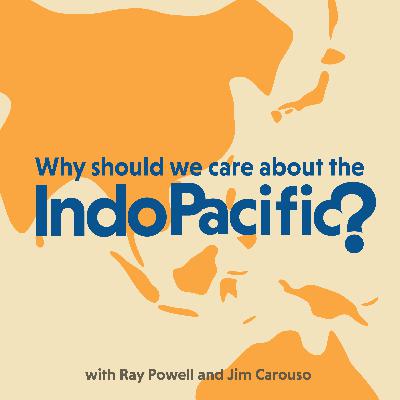
Why Should We Care About the Indo-Pacific?
Author: Ray Powell & Jim Carouso
Subscribed: 44Played: 1,585Description
Chart the world's new strategic crossroads. Join co-hosts Ray Powell, a 35-year U.S. Air Force veteran and Director of the celebrated SeaLight maritime transparency project, and Jim Carouso, a senior U.S. diplomat and strategic advisor, for your essential weekly briefing on the Indo-Pacific. Drawing on decades of on-the-ground military and diplomatic experience, they deliver unparalleled insights into the forces shaping the 21st century.
From the U.S.-China strategic competition to the flashpoints of the South China Sea and Taiwan Strait, we cut through the noise with practical, practitioner-focused analysis. Each episode goes deep on the region's most critical geopolitical, economic and security issues.
We bring you conversations with the leaders and experts shaping policy, featuring some of the world's most influential voices, including:
- Senior government officials and ambassadors
- Defense secretaries, national security advisors and four-star military officers
- Legislators and top regional specialists
- C-suite business leaders
This podcast is your indispensable resource for understanding the complexities of alliances and regional groupings like AUKUS, ASEAN and the Quad; the strategic shifts of major powers like the U.S., China, Japan and India; and emerging challenges from economic statecraft to regional security.
If you are a foreign policy professional, business leader, scholar, or a citizen seeking to understand the dynamics of global power, this podcast provides the context you need.
Subscribe now on Apple Podcasts, Spotify, YouTube or your favorite platform.
Produced by Ian Ellis-Jones and IEJ Media.
Sponsored by BowerGroupAsia, helping clients navigate the world’s most complex and dynamic markets.






biased much?
https://www.agmglobalvision.com/ expertise in electro-optics was a deciding factor in my decision to work with AGM Global Vision. This ambitious company has grown substantially since its 2019 establishment, and it primarily operates in the fields of digital optics, thermal imaging, night vision, and related areas. It is not a simple chore to discover a broad choice of equipment in over 100 countries. Modern innovations in optics have rendered the Avengers' signature capes superfluous in this situation. We can all see that AGM makes high-quality performance equipment. No matter what your outdoor goals are, AGM is here to help you achieve them.